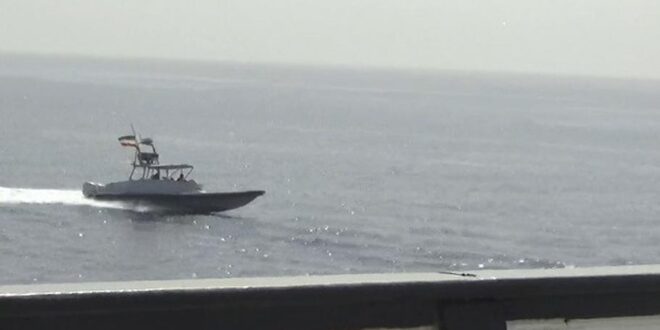The United States and Iran had their latest near miss Monday, after three vessels controlled by Tehran’s Islamic Revolutionary Guard Corps buzzed two American ships at what the U.S. military called “dangerously high speed.”
The USS Sirocco, a Cyclone-class patrol ship, and the USNS Choctaw County, a fast transport vessel, were in routine transit through international waters in the Persian Gulf when three Iranian boats designed for fast attack approached the Sirocco head on, according to a U.S. military official, who spoke on the condition of anonymity to describe the encounter. They diverted only after the Sirocco issued an audible warning signal. The Iranian boats also came within 50 yards of the Choctaw County, prompting the Sirocco to deploy a warning flare.
The Iranian navy’s actions “did not meet the international standards of professional or safe maritime behavior, increasing the risk of miscalculation and collision,” said Col. Joseph Buccino, spokesman for U.S. Central Command. “CENTCOM forces will continue to fly, sail and operate anywhere in the area of responsibility international law allows while promoting regional stability.”
Monday’s dramatic interaction, lasting about an hour, ended when the Iranian ships departed the area, officials said.
It was the latest close encounter between Iranian and American vessels in the Gulf.
Last year, according to reports, three Iranian fast-attack craft similarly barreled down on two U.S. vessels patrolling international waters in the Persian Gulf, coming within 68 yards and prompting the American ships to fire warning shots.
In 2020, the United States accused 11 Iranian ships of making “unsafe and unprofessional” moves when they zipped around American vessels.
The United States also has periodically accused Iranian aircraft of menacing and dangerous maneuvers against American vessels in international waters.
It is unclear whether the interactions at sea are related to negotiations toward a new international pact to manage Iran’s nuclear ambitions, which have largely stalled.
Last week, the U.S. Treasury levied new sanctions against a group of Iranian petrochemical producers and related “front companies” the U.S. government believes had been helping Tehran evade preexisting restrictions.
 Eurasia Press & News
Eurasia Press & News




